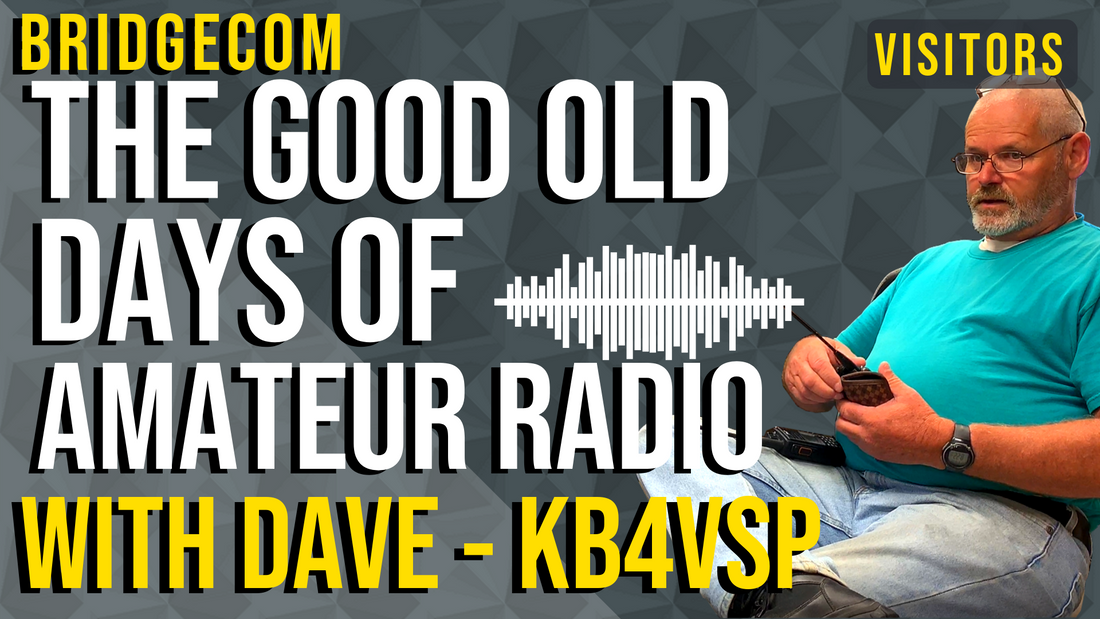
The Good Old Days of Amateur Radio with Dave, KB4VSP.
- Hey, this is Ron with KCØQVT. Dave KB4VSP. Came all the way from Holts Summit, Missouri. Picked up a repeater. Got to, just, we're gonna visit with him and hang out as we build him up a repeater. So, anyway, yeah. All the way up from Holts Summit, Missouri. So, anyway, it's good to know you, man.
- [Dave] Thank you.
- [Ron] Yeah.
- [Dave] You guys are top notch. I called Dan Thursday, today is Friday. I explained to him that, you know, what I needed and what I wanted to do, and they were kind enough to stop their operation to take this as a priority, so...
- [Ron] It's awesome.
- [Dave] Ron went way out of his way and the whole staff.
- [Ron] Yeah, so we're gonna do, you know, while we build up his repeater and get him going, we're gonna just interview him and find out what, where, you know, where Dave came from and where he came from I mean and also, you know, how he became a ham and why he's into digital. So, anyway, yeah. Enjoy.
- [Ron] You know, you're into ham radio and you got into it when you were a younger guy. Was it just 'cause you were like into electronics? I mean, 'cause you said--
- [Dave] I was always fascinated by radio. When I was a kid (scoffs) here I go with my age.
- [Ron] That's alright (laughs).
- [Dave] We didn't have FM. It was AM back in the day. When I was raised. So, AM, what was on AM? Shortwave. I had an old, Hallicrafter that somebody had and I bought it, was an SX-99. And I also had a 100. And I actually modified it to make a VFO so that I could listen to the sideband. So we used to listen to shortwave, you know.
- [Ron] Well, how old were you when this was going on?
- [Dave] Oh, probably… Early teens, maybe.
- [Ron] Yeah? This is when you were living in New York?
- [Dave] Yes.
- [Ron] Were you a licensed ham at that point?
- [Dave] Well, again, like I said, we had a church group, and one of our leaders was a ham radio operator, W2DQL. Don Cronemeyer, he was, he worked for IBM, he was a physicist, you know. And so he held classes in downstairs in the church. And back in those days, you know, commercial equipment was very, very limited. He was, you know, 'course he had Collins gear, which was like top of the line back in those days, you know. And so, Heathkit was the only one that was really making anything in the amateur market commercially. You had Allied and stuff like that, you know, some of the older stuff. So, I took my… My novice license test down in Warwick Street with the FCC, 'cause back in those days, you went down there and had to demonstrate both sending and receive, you know, and take a written test. Back in those days, it wasn't multiple choice. It was, you know, they would say, "Okay, make a schematic for an oscillator." And you had to know exactly what was required to do that, They would say something like, "Okay, draw a resistor, draw an MPN transistor," you know, those kind of things. And that's the way it was done. 'Course over the years it evolved to multiple choice and other things, so… I took my Extra and at that time, it was required to have 20 words a minute for Extra. I was actually at 35 words a minute for proficiency at that time.
- [Male offscreen] Wow.
- [Ron] So did you get into DXing?
- [Dave] Oh, I was very big into the HF. Now, what really kinda triggered my interest was back in the late '70s, the digital modes were starting to appear. Packet, you know, RTTY, you know, those kind of things. Well, IBM wasn't making a personal computer for the home market. So, guess what I was using for a computer? A Commodore 64 and a 128. (laughs) With a big ol' three I think it was a 5.5 floppy drive.
- [Ron] Yeah, this is mid-80s.
- [Dave] You know, we're talkin' back in those days, that was high tech stuff.
- [Ron] Yeah, that was when I was a little kid, yeah.
- [Dave] So, you know, I was doing RTTY, I was, you know, I had-- matter of fact, I still have my modems. I've got my MFJs my Kams, and so, anyways. So I got into Packet. Well, Packet was, at that time was in infancy. You know, things, you know, people were like trying-- So back in those days, I don't know if you've ever operated Packet or not. But back in the first early part of the days of Packet, you had to use a digipeater to jump from one, two, three to get long distance. Well, we were jumpin' probably fifty, a hundred digipeaters all the way down to the, you know, down the East Coast, down to Virginia. And then, HF was the big thing, you know. You set your modem up to your HF and you could take your packet traffic and your BBS, 'cause BBSs were basically mailboxes, mail you know. You know, storage, receive. Well, FBB and WA7, or whatever. There was multiple, ROSE server. All those things, you know, were in the packets. So we put up a network, a few buddies and I, set up this HF gateway, to where, you know, we could send our BBS traffic, instead of having to go through all the relay systems to get to where it needed to go, we can go from gateway to gateway for long distances. For instance, from New York, if I needed traffic to go to Virginia, to a BBS located in Virginia, I would just pass it through my HF gateway and send it down to an HF gateway in Virginia, and then they could do it locally right from there.
- [Ron] And this is over RF not through phone line?
- [Dave] RF, this was RF. RF through H--
- [Ron] I had no idea that, you know, we used to do a lot of BBS.
- [Dave] Yeah.
- Where you dial up the...
- [Dave] Right.
- [Ron] Use your modem
- [Dave] Right, right
- [Ron] with your computer and dial up the--
- [Dave] Well, it's basically the same thing but using RF.
- [Ron] That's incredible. I missed that point (chuckles).
- [Dave] And so that became a real big thing back in the day.
- [Ron] Wow.
- [Dave] Then the net came out and ROSE server, that's where you had the packet… Repeaters, basically what we call 'em, and they would be at a central point. And, so, you would connect to it, and then it was a smart thing, it would have all the nodes that would come up that you could connect to and automatically send it in routing. I had 440. and 220 was actually the backbone back in the day for packet. You go in on VHF and used 220 at 9600 baud, which was big-time speed back in those days. And that would backbone all that stuff and we'd have like all these nodes that'd be connected all over the country. And if they were going through the HF gateways, we had gateways for nodes for that too that we could go world-wide with this thing. So you could actually have a packet, you know, terminal to terminal communication or send, you know, packet emails and those kind of things. So it got pretty elite. So packet kinda subsided. And so… But, it's coming back. A lot of your EOC's are actually using that as their information database. Like say, for instance, you have a laptop, and you're, you're stationed at, let's say, a hospital. And you need to communicate, you know, casualties or whatever it is, you could send that information via the terminal to somebody else, maybe at the EOC, or wherever it's needed, and they can, you know, keep tabs of stuff like that.
- [Ron] Is this what's called Fldigi?
- [Dave] Yes, it's, Fldigi was kind of… That's what they're using now.
-[Ron] Yeah.
- [Dave] But it's really based upon, when you go back to it, it's really based upon the old packet.
- [Ron] So, what I'm hearing is, when you were a younger guy, and got into this, you were, you were dabbling with digital in a way. You know, you talked about--
- [Dave] Yeah, I've been experimenting with all that.
- [Ron] So it seems like a natural thing for you to do, almost to gravitate into DMR because it's digital,
- [Dave] Right.
- [Ron] It just, kind of fits where you've been moving all this while in your ham radio experience.
- Well, you have to have an open mind with amateur radio. Even when I was a kid, you know, seeing it, you know, vacuum tubes, 'cause that's what it was, transistors were just starting to come around back in those days. So, you know, we had to build our own gear. I built my first ham gear from Heathkit. I bought the kit, you know. I had HW101s, the SB102s, the 303, the 404 combination. They were really, back in the day, Heathkit was a real, real nice set line of equipment.
- [Male offscreen] Well, yeah, I restored an old Tempo One.
- [Dave] Tempo One, I've had those too.
- [Male Offscreen] Yep,
those are awesome (laughs)
- [Dave] I had a Tempo One, I had
- [Ron] Wow.
- [Dave] I still have my Yaesu FT-757, the very first one that came out, And that came out in 1982, I believe. And I have that in its original box.
- [Ron] So, I'm just curious, when you got into DMR, what did you find to be the biggest challenge? Or are you still...
- [Dave] Initially, with the different types of radios, the programming part of it is, can be a challenge until you get to know the software.
- [Ron] Yeah.
- [Dave] And the particular radios. As far as the operation was concerned, I pretty much, that was pretty much, pretty straight forward, once you knew exactly what, who you wanted to talk to, what, you know...
- [Ron] So, where did you, where did you learn to, I mean, were you just online?
- [Dave] I did a lot of research.
- [Ron] Yeah.
-[Dave] I looked at your initial website. I looked at, you know, others, you know, people that were doing DMR and stuff like that. So, I'm basically, self-taught, I guess.
Transcript from Ron, KCØQVT, with Dave, KB4VSP.







1 comment
Dave, you brought back the good old days. Packet radio and the other equipment you had said in your conversation. Fast scan TV was my fun on the UHF bands
73…
Bruce